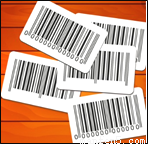题目内容
阅读短文,根据短文内容回答问题。

We see them everywhere — on boxes of food, on packages and on CDs. They, of course, are bar codes. The invention of bar codes has changed the way we shop and how companies learn where their products are.
It was two university students from America, Bernard Silver and Norman Woodland, who first got theidea of bar codes. In 1948, they heard that the president of a food company was looking for a way to easily get information about what was being sold to customers. They tried to help by using a code system. They invented a large electronic reader to read the codes. However, computers couldn’t easily record the data that was read.
Then, in the 1960s, David Collins made important developments in bar codes. He developed a system for recognizing train carriages. In order to develop the recognition system for other kinds of businesses, Collins started his own company. In 1969, Collins’s company put a bar code reading system in a car factory, showing that bar codes could be useful.
Shortly after Collins started his company, an American electronic company called RCA also saw the potential (潜力) of bar codes to help businesses. RCA’s
system, which recorded how much of a product was sold, was not perfect. Since bar codes were not common, not all products had them and different companies used different codes. Then, Woodland helped develop the Universal Product Code (UPC), which gave every product a code that included information about the manufacturer and the kind of product being sold. This made bar codes much more practical.
In addition to shops, hospitals use bar codes to recognize patients by giving them cards with bar codes on them. Libraries use bar codes to record which books have been lent, and airports use them to find out where bags are going. Bar codes have made life much easier and simpler.
1.What changed the way we shop?
2.Who first got the idea of bar codes?
3.Why did Collins start his own company?
4.What do hospitals use bar codes to do?
5.What is the passage mainly about?
1.The invention of bar codes has changed the way we shop./The invention of bar codes./Bar codes. 2.It was two university students from America, Bernard Silver and Norman Woodland./Bernard Silver... 阅读快车系列答案
阅读快车系列答案
